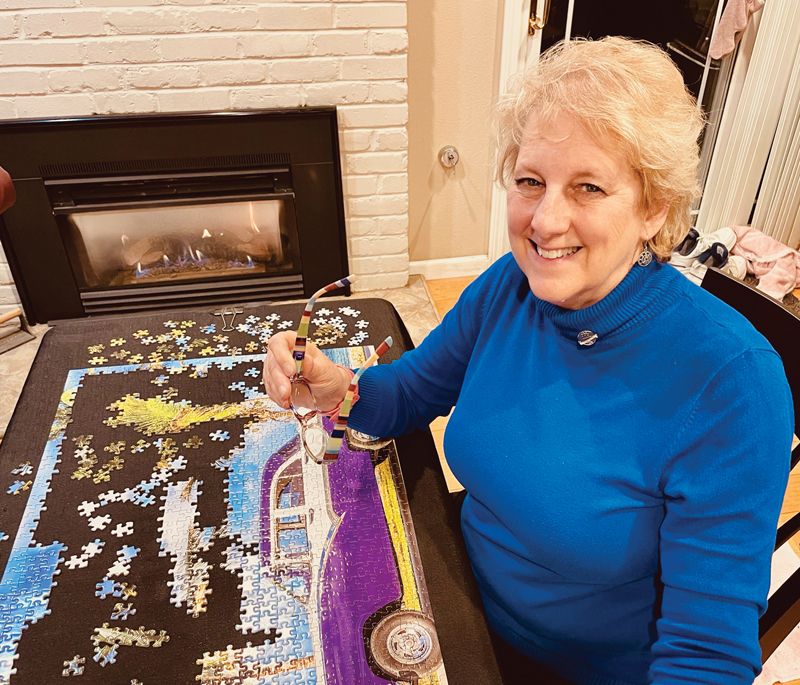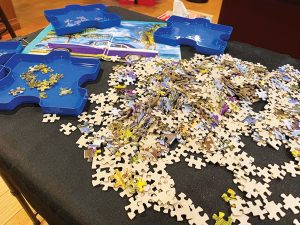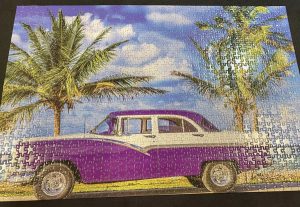Putting together the pieces is all part of the game

CONCORD, CA (Jan. 22, 2023) — Those who crave the challenge of tackling jigsaw puzzles were once known as dissectologists, after the centuries old craft of hand cutting wooden pictures with a fret saw into irregular shapes. Now every Jan. 29 is dedicated to those who enjoy this particular brain exercise.
Concord accountant Beri Kasper, 65, is among those whose passion for doing jigsaw puzzles has grown from a simple dining room table pastime into something shy of an obsession. For others, the fascination has risen to international implications.
“Less frustrating than golf, less dangerous than pickleball, a puzzle passion is good for mind, body and soul,” she said.
Puzzling has been her go-to way of unwinding from a long day of work or caring for family since 2014. Up to then, solitaire with actual cards was her fix.
She discovered puzzling when hosting a foreign exchange student; it served as a good icebreaker with their guest.
“It was a way to communicate that you don’t need a lot of words,” said Kasper. “This translates into different languages.”
Puzzling has morphed over time

Jigsaw puzzles were called dissected maps as well as dissected puzzles prior to and during the 19th century. Wooden pictures were hand cut with a fret saw into irregular shaped pieces to be reassembled.
The reference to dissected maps was because some of the earliest puzzles were made from printed maps. These puzzles were educational as well as recreational. They could also be referred to as picture maps and wooden maps.
Fast forward to 2023, and U.S. and international organizations are now dedicated to the love of jigsaw puzzles. Each year on the last weekend of September, enthusiasts descend upon Valladolid, Spain, for the jigsaw puzzle world championship hosted by the World Jigsaw Puzzle Federation. The event recognizes the fastest jigsaw puzzlers in the world in three categories: teams, pairs and individuals.
While other puzzlers are hardcore, Kasper is content with having one set up on a table that fits perfectly behind a love seat in her home’s great room. She puzzles for an hour most evenings. With a comfy chair, she watches football or whatever, or not, and puzzles away to her heart’s content.
Some get finished quickly, and she is eager to start another.
Kasper has received her share of puzzles over the years; she keeps some, while others get donated after being worked. Her favorites include ones whose pictures are places she has visited such as one of Cabo San Lucas.
“A person took a picture and made it into a puzzle,” Kasper said of the gift.
Through the years, Kasper acknowledges ones that have tested her. It took her two months to complete a gift from the Rotary Club that had her name and the Rotary logo on a white background.
Another was one with an embroidered cat with a lot of colors in it. Entitled “Puzzle so Hard,” “it was,” Kasper mused.
Each puzzle a new challenge

Kasper relishes puzzling’s mental aspect. Two piles of puzzles occupy different rooms of her home while others are stashed in various dresser drawers. All total there’s about 25, of which half she has yet to do.
“Honestly, I think it is good to be doing something other than watching TV or being online,” said Kasper, an accountant who often has three screens going at a time at work.
“It’s a really good way to get your work brain off and relax brain on,” she added.
Satisfaction comes with finding that elusive piece, or just discovering different ways to do puzzles.
Hardest part of puzzling? Finishing.
So is doing one that is missing a piece.
Her advice to newcomers is to dump all the pieces and sort by colors and edges. Start with the edges, then move to the middle.
Trading puzzles with other puzzlers is part of the experience. In cases where she has discovered a piece has gone MIA, she either writes a note on the lid of box or takes a photo before returning the puzzle to its owner.
But Kasper doesn’t dwell on this disappointment. It’s just on to the next puzzle.
Read more: Puzzlers share their passion with the Pioneer
A plethora of puzzles: Let’s see yours
If you’re among those with a puzzle always in progress, send a snapshot of your current project to Editor@pioneerpublishers.com, and we’ll post it on the Pioneer website. Who knows? You might even inspire a future jigsaw world champion to get puzzling.
